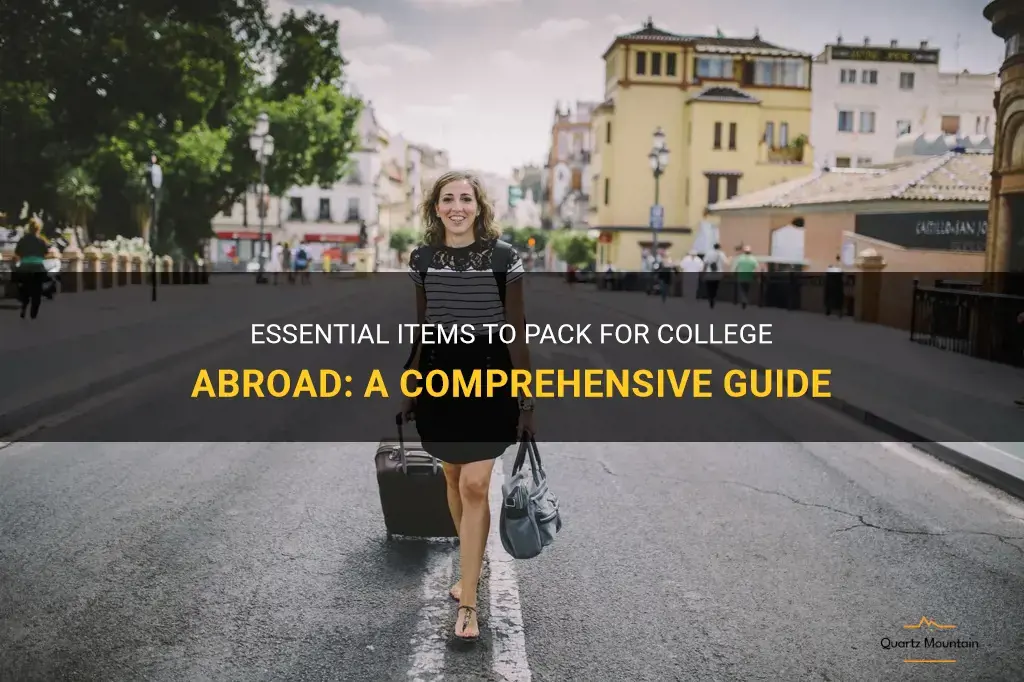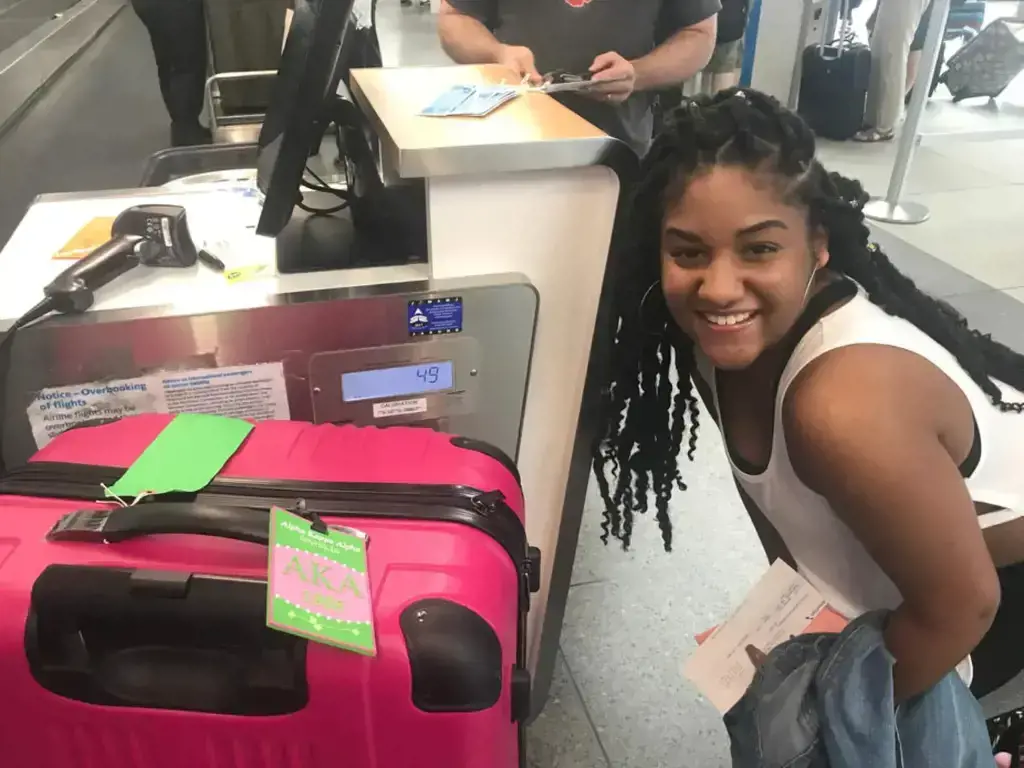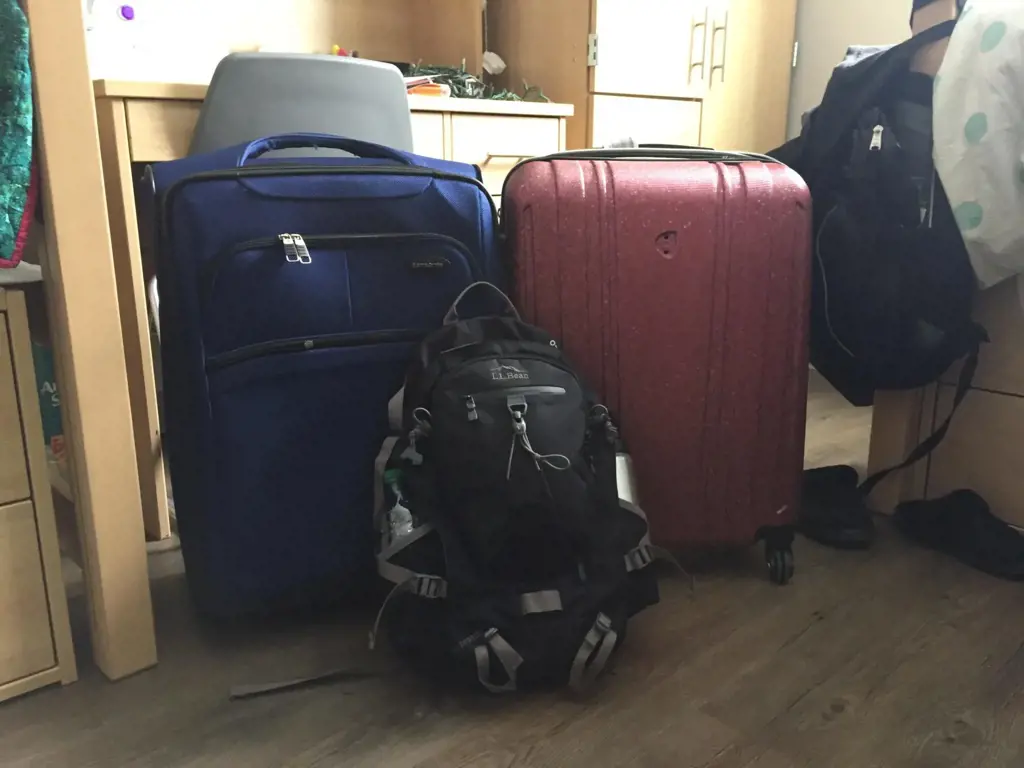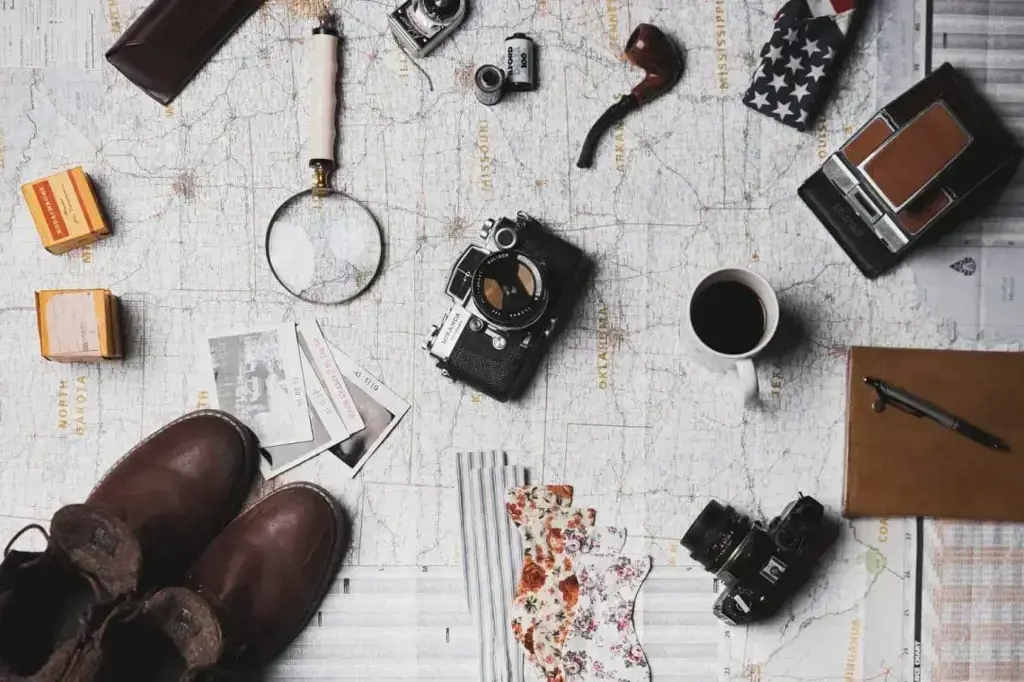
Are you preparing for an exciting journey studying abroad in college? From exploring new cultures to making lifelong friends, studying in a foreign country offers countless adventures. However, before you embark on this exciting chapter, you'll need to pack your bags with essential items that will help you make the most of your experience. In this comprehensive guide, we will walk you through the must-have items to pack for college abroad, ensuring that you are fully prepared for your educational and cultural adventure. So, grab your passport, and let's dive in!
What You'll Learn
- What are the most essential items to pack when studying abroad in college?
- Are there any specific clothing items or accessories that are important to bring?
- Should I pack any items that might not be easily accessible or affordable in my host country?
- Are there any electronics or technology items I should bring for school or personal use?
- What are some tips for maximizing space and minimizing the amount of items I need to pack for college abroad?

What are the most essential items to pack when studying abroad in college?

When studying abroad in college, it is essential to pack the right items to ensure a smooth and comfortable experience. Here are some of the most essential items to consider when packing for your study abroad adventure:
- Travel Documents: Before you pack anything else, make sure to organize and secure all your travel documents. This includes your passport, student visa, identification cards, and any other necessary paperwork. It's a good idea to keep copies of important documents in case of loss or theft.
- Clothing for all Weather: Depending on your destination, you will need to pack appropriate clothing for different weather conditions. Research the climate of your study abroad location and pack a mix of comfortable and versatile clothing for any situation. Make sure to pack essentials like coats, sweaters, t-shirts, pants, and appropriate footwear.
- Electronics and Adapters: In today's digital age, it is crucial to have your electronic devices with you when studying abroad. Don't forget to pack your laptop, tablet, or smartphone, along with their chargers. Additionally, make sure to bring universal power adapters to ensure that your electronics can be charged in any country you visit.
- Medications and First Aid Kit: If you have any pre-existing medical conditions or take regular medications, it's important to bring an ample supply for the duration of your study abroad program. Additionally, pack a basic first aid kit with essentials like band-aids, pain relievers, and any other necessary over-the-counter medications.
- Money Management Tools: When studying abroad, it's important to have a plan for managing your finances. Consider bringing a debit or credit card that can be used internationally, along with some local currency to get you started. It may also be helpful to have a budgeting app or spreadsheet to keep track of your expenses.
- Toiletries and Personal Care Items: While you can always purchase toiletries and personal care items abroad, it's a good idea to bring some essentials with you. Pack items like toothpaste, shampoo, soap, and any other personal care items that you may be particular about or may not be readily available in your study abroad location.
- Comfort Items from Home: Moving to a new country can be exciting but also overwhelming. Bringing along a few comfort items from home can help ease any homesickness or culture shock. This can be something as simple as a favorite book, a family photo, or a small memento that reminds you of your loved ones.
- Adaptability and Open Mind: While not a tangible item, having an adaptable and open mind is crucial when studying abroad. Embrace the opportunity to learn about new cultures, try new foods, and experience new things. Remember, being open to new experiences will enhance your study abroad journey.
It's important to consider the length of your study abroad program and the specific requirements of your destination when deciding what to pack. Make a checklist and start packing well in advance, allowing yourself enough time to gather everything you need. By packing these essential items, you can ensure a successful and enjoyable study abroad experience.
Essential Items to Pack for Your Trip to Italy
You may want to see also

Are there any specific clothing items or accessories that are important to bring?

When preparing for a trip, it's important to consider the clothing items and accessories you'll need. The specific items you should bring will depend on the location, climate, and activities you have planned. However, here are some general guidelines to help you pack for your trip.
First and foremost, it's important to check the weather forecast for your destination. This will give you an idea of the temperature and weather conditions you can expect during your trip. Based on this information, you can select appropriate clothing items.
For warm weather destinations, it's essential to pack lightweight and breathable clothing. Opt for fabrics like cotton or linen that will allow air to flow and keep you cool. Bring shorts, t-shirts, and tank tops for casual wear, as well as a few lightweight dresses or nicer outfits for evenings out. Don't forget to pack a swimsuit and cover-up if you plan on swimming or visiting the beach.
For colder climates, you'll want to pack layers. Start with a base layer made of a moisture-wicking fabric, like merino wool, to keep you dry. Add insulating layers such as a fleece jacket or sweater, and top it off with a waterproof and windproof outer layer. It's also important to bring warm accessories like hats, gloves, scarves, and thick socks to keep extremities cozy.
Regardless of the destination, it's always a good idea to pack a versatile jacket or coat that is suitable for various weather conditions. Look for a lightweight and packable option that can be easily folded or rolled up in your suitcase.
When it comes to footwear, comfort should be a priority. Pack a pair of walking shoes or sneakers for day-to-day activities and sightseeing. If you plan on engaging in outdoor adventures like hiking or camping, consider bringing a pair of sturdy hiking boots. Additionally, it's a good idea to pack a pair of sandals or flip-flops for beach or pool days.
Accessories are another important consideration when packing for a trip. Sunglasses will help protect your eyes from the sun, and a hat or cap will shield your face from harmful UV rays. Don't forget to bring a raincoat or travel umbrella to stay dry during unexpected showers. Other useful accessories to consider include a backpack or day bag for carrying essentials, a money belt or secure pouch for keeping valuables safe, and a travel pillow or eye mask for long flights or train rides.
Lastly, it's important to consider the cultural norms and customs of your destination when selecting your clothing items and accessories. For example, some religious sites may require you to cover your shoulders or wear a headscarf. It's always a good idea to research local customs and dress appropriately to show respect for the local culture.
In conclusion, when packing for a trip, it's important to consider the weather, location, and activities you have planned. Select clothing items that are appropriate for the climate and pack versatile layers. Comfortable footwear and essential accessories like sunglasses and a raincoat are also important to bring. Additionally, be mindful of local customs and dress appropriately for your destination. With these tips in mind, you'll be well-prepared for your trip.
What to Pack for Your UC Davis Essentials
You may want to see also

Should I pack any items that might not be easily accessible or affordable in my host country?

Preparing to move to a different country can be an exciting yet overwhelming experience. One factor to consider when relocating is the accessibility and affordability of certain items in your new host country. While modern globalization has made many goods readily available worldwide, there are still some items that might not be easily accessible or affordable in certain regions. Therefore, it would be wise to pack these items to ensure you have everything you need in your new home.
One way to determine which items might be difficult to access or afford is by researching the local market and customs of your host country. Understanding the cultural norms and lifestyle of your new community can help you identify specific items that might not be commonly found. For example, if you are moving to a vegetarian-friendly country, you may find it harder to locate specialty meat products or specific cooking ingredients.
Another approach is to consider your personal needs and preferences. Are there any particular brands or products that you rely on for daily use? If these items are not well-known or popular in your host country, it might be a good idea to pack them. This could include personal care products, specific medications, or even favorite snacks. By bringing these items with you, you can ensure that you have access to the products you are accustomed to using.
Additionally, it is essential to consider the cost of living in your new host country. While some items may be available, they might come at a significantly higher price compared to your home country. This could be due to import taxes, shipping costs, or simply the popularity of certain goods. If you anticipate that certain items will be unaffordable, it would be wise to pack them in advance. This could include electronics, clothing, or even specific foods or beverages.
When deciding which items to pack, it is important to be mindful of the regulations and restrictions of your host country. Some items may be prohibited or subject to import duties. Check with the local customs office or embassy to ensure that you comply with all the necessary regulations. Being aware of any limitations will help you avoid any unnecessary complications when moving to your new country.
In conclusion, packing items that might not be easily accessible or affordable in your host country can save you time, money, and effort in the long run. By thoroughly researching the local market and customs, considering your personal needs and preferences, and being aware of the cost of living, you can identify which items are worth packing. Remember to respect any regulations and restrictions regarding imports to ensure a smooth transition to your new home.
10 Must-Have Travel Essentials: What to Pack for Your Next Trip
You may want to see also

Are there any electronics or technology items I should bring for school or personal use?

In today's digital age, electronic devices and technology have become an integral part of our lives, both in school and for personal use. With the advancements in technology, bringing certain electronic devices and gadgets can greatly enhance your learning experience and make everyday tasks more efficient and convenient. Here is a list of recommended electronics and technology items you should consider bringing for school or personal use:
- Laptop or Tablet: A laptop or tablet is essential for schoolwork, note-taking, research, and project management. They provide a portable and versatile platform for writing papers, creating presentations, and accessing online resources. Choose a device that suits your needs and budget, considering factors such as processing power, storage capacity, and battery life.
- E-Reader: If you are an avid reader, an e-reader can be a great investment. Not only does it save space by allowing you to carry multiple books in one device, but it also offers features like adjustable font sizes, built-in dictionaries, and annotation capabilities. E-readers are particularly useful for highlighting and taking notes on textbooks and research papers.
- Smartphones: Smartphones have become an essential part of our lives, providing connectivity and convenience. With a smartphone, you can easily stay organized with calendars, reminders, and to-do lists. They also offer access to educational apps, online libraries, and collaborative platforms for group projects. Additionally, smartphones allow you to capture photos and videos for documenting and sharing information.
- Noise-Canceling Headphones: For those who prefer a quieter environment while studying or have trouble concentrating amid distractions, noise-canceling headphones are a game-changer. These headphones use special technology to reduce or eliminate external noise, allowing you to focus better on your tasks and improving productivity.
- Portable Chargers: With all the electronic devices we rely on, running out of battery power can be a major inconvenience. Portable chargers, also known as power banks, are compact and handy devices that allow you to recharge your devices on the go. Make sure to choose a power bank with enough capacity to fully recharge your devices multiple times.
- Bluetooth Speakers: If you enjoy listening to music or podcasts while studying or want to enhance multimedia presentations, Bluetooth speakers can be a great addition. These wireless speakers connect to your laptop or smartphone, providing better sound quality and volume compared to built-in speakers.
- Graphing Calculator: For students studying mathematics or other subjects that involve complex calculations, a graphing calculator is a must-have tool. These calculators can perform advanced calculations, graph equations, and store formulas, making them invaluable for solving equations, plotting graphs, and analyzing data.
Remember to check with your school or institution to ensure that there are no restrictions or limitations on the use of certain devices in the classroom. Also, take measures to protect your electronic devices by investing in protective cases, screen protectors, and reliable antivirus software.
In conclusion, bringing certain electronics and technology items for school or personal use can greatly enhance your learning experience and productivity. From laptops and e-readers to smartphones and noise-canceling headphones, these devices provide the means to access information, stay organized, and effectively manage your academic and personal life. Just ensure that you choose devices that suit your needs, comply with school regulations, and take measures to protect them for long-lasting use.
Essential Items to Pack for a Russian River Cruise
You may want to see also

What are some tips for maximizing space and minimizing the amount of items I need to pack for college abroad?

When preparing to study abroad, one of the challenges many students face is packing. Trying to fit all of your belongings into a limited amount of space can be quite daunting. However, with some careful planning and organization, you can maximize your space and minimize the amount of items you need to pack. Here are some tips to help you with this process:
- Research your destination: Before you start packing, take some time to research your destination. Find out what the weather is like, what the local culture is, and what is readily available in terms of items such as toiletries and household goods. This will help you determine what you can leave behind and what you will need to bring with you.
- Make a packing list: Creating a packing list is essential to ensure that you don't forget anything important. Start by writing down all of the essential items that you will need, such as clothing, linens, and toiletries. Then, go through the list and ask yourself if each item is truly necessary. Try to prioritize your list and eliminate anything that you can live without or buy once you arrive at your destination.
- Pack versatile clothing: When it comes to clothing, think in terms of versatility. Choose items that can be mixed and matched to create different outfits. Stick to neutral colors and pack a few statement pieces to add variety. This will allow you to minimize the amount of clothing you need to pack while still having different outfit options.
- Utilize packing cubes and vacuum bags: Packing cubes and vacuum bags can be a lifesaver when it comes to maximizing space in your suitcase. Use packing cubes to organize your clothing and keep everything compact. Vacuum bags are great for reducing the size of bulkier items such as jackets and bedding.
- Take advantage of digital resources: Instead of packing physical books, consider using a Kindle or e-reader to store all of your reading material. This will save you valuable space in your luggage and give you access to a wide variety of books while you're abroad.
- Leave behind unnecessary electronics: While it can be tempting to bring all of your electronic devices with you, think about what you will actually need. Do you really need a laptop, tablet, and smartphone? Consider leaving behind any devices that you can live without or that can be easily replaced once you arrive at your destination.
- Purchase items when you arrive: Instead of packing everything you think you might need, consider buying certain items once you arrive at your destination. This can include toiletries, cleaning supplies, and kitchen utensils. Not only will this save you space in your luggage, but it can also be a fun way to explore the local culture and support local businesses.
By following these tips, you can maximize the space in your luggage and minimize the amount of items you need to pack for college abroad. Remember to prioritize and be selective about what you bring with you, and take advantage of resources and options available to you once you arrive at your destination. Bon voyage!
Essential Items to Pack for CU Boulder Students
You may want to see also
Frequently asked questions
When packing for college abroad, it’s important to bring along essential items that will help make your transition smoother. These items include your passport, visa documents, and any other necessary paperwork. You should also bring enough clothing for all types of weather, as well as any personal items that will make your dorm room feel more like home. It’s a good idea to bring a power adapter for your electronics, as well as any necessary medications or toiletries that may be harder to find in your host country.
When deciding how much clothing to pack for college abroad, it’s important to strike a balance between having enough options and not overpacking. A good rule of thumb is to pack enough clothing for about two weeks, with the understanding that you will have access to laundry facilities. This will ensure that you have enough options to mix and match outfits, while also allowing you to save space in your luggage. It’s also a good idea to research the weather in your host country before packing, so you can pack accordingly.
While it’s tempting to bring all of your electronics to college abroad, it’s important to consider the practicality of doing so. Depending on the voltage in your host country, you may need a power adapter or converter for your electronics, which can be an added hassle. Additionally, electronics can be expensive and may be at risk of theft or damage while abroad. It’s a good idea to prioritize which electronics are essential for your studies and personal use, and leave the rest behind. You can also consider buying or renting electronics locally once you arrive at your destination.
When studying abroad, it’s important to make your dorm room feel like a home away from home. This can help ease any feelings of homesickness and make your adjustment to a new country easier. Some ways to make your dorm room feel cozy and familiar include bringing photos or decorations that remind you of home, packing your favorite bedding or blankets, and bringing along small items that have sentimental value. You can also consider bringing a few small kitchen gadgets or appliances that you use frequently, to make cooking or preparing meals easier.







